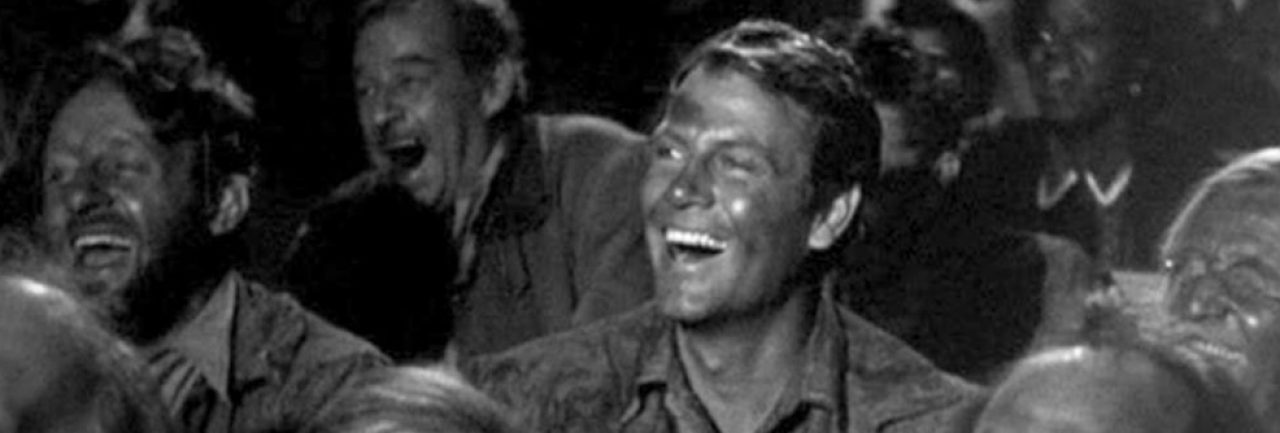The 1945 British film Brief Encounter — directed by David Lean, screenplay by Noel Coward, based on his play — may hold the record for the movie that’s watched in the greatest number of other movies. In addition to the three examples discussed in this post, IMDB’s valuable (though sometimes overpopulated) “Connections” department lists it as being featured in The Mirror Has Two Faces, Till There Was You, and Brick Lane, as well as the TV movies The Heidi Chronicles, Daisies in December, and The Care and Handling of Roses, plus various television episodes.
Why the attraction? It’s not simply that Brief Encounter is a classic. (In 1999, the British Film Institute voted it that country’s second best movie of all time, behind only The Third Man.) Beyond that, the film, with its thoroughly decent, stiff-upper-lip, and ultimately self-sacrificing lovers — the black-and-white photography being a kind of spartan objective correlative — is an emblem for a certain vision of romance, and thus a counterpoint to (and occasionally model for) the many, many other kinds of romance that movies portray.
In Melvin Frank’s A Touch of Class (1973), the contrast couldn’t be starker. After meeting cute what seems like eleven times, the characters played by the startlingly young, slim, sharply dressed, and good-looking Glenda Jackson (Vickie) and George Segal (Steve) embark on a strictly-for-sex affair. In Brief Encounter both of the lovers are married, but here Vickie is divorced, which hints at the unequal dynamics at play. Steve wants to have it both ways, which is in keeping with his me-me-me sense of the world; he’s always shown scurrying off from the opera intermission to shtup Vickie at their love nest, then hurrying back to his seat next to his wife before the end of the next act. The puzzlement of the movie is why Vickie — who, as a Glenda Jackson character, is required to be clear-eyed and intelligent — doesn’t dump Steve.
The answer — that she has fallen in love with him, and he with her — is supplied in the movie-in-movie scene, in which they watch Trevor Howard breaks bad news to Celia Johnson. The scene is asked to do the work that’s absent in the screenplay, their boo-hooing supposedly showing the relationship has reached a new level of intimacy and care. Then the alarm rings, and Steve scurries back to his family.
David Jones’s 84 Charing Cross Road (1987) is about an American writer, played by Anne Bancroft, who carries on a two-decade correspondence (1950s and ’60s) with the buyer at a London bookshop, played by Anthony Hopkins. He’s married and they never meet; the love that Brief Encounter reflects is her Anglophilia. Her fascination with the film seems to extend to the ash of her cigarette (yes, young’uns, smoking in cinemas used to be allowed), curling and lengthening but so wrapped up in the oh-so-Englishness of the movie that it doesn’t drop.
And now for something different, Anthony Minghella’s 1990 film Truly Madly Deeply. The love story here is between Nina (Juliet Stevenson) and her boyfriend, Jamie (Alan Rickman), who keeps turning up even though he is dead. But this is no Ghost: Jamie is sniffling, needy, and annoying. And so are his movie-buff mates, who show up at en masse, wrap themselves in cozy duvets, and make trainspotting comments while watching the 1917 Charlie Chaplin comedy Easy Street. (Like many movie buffs, myself include, they are prone to error; one guy identifies the big comic as “Eric Stewart Campbell”; in fact, his given name was Alfred Eric Campbell. It is true that he died in a car crash shortly after making this film.)
The guys may be well-schooled in cinema, but they’re not too sophisticated to be wrapped up in Brief Encounter, reciting the final lines along with the Johnson character’s husband, and slow clapping their approval after “The End” rolls.
